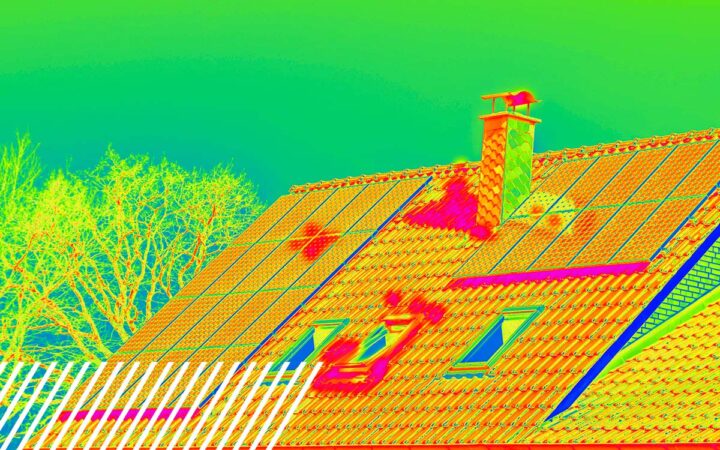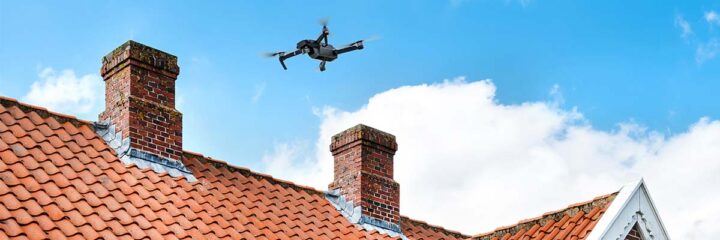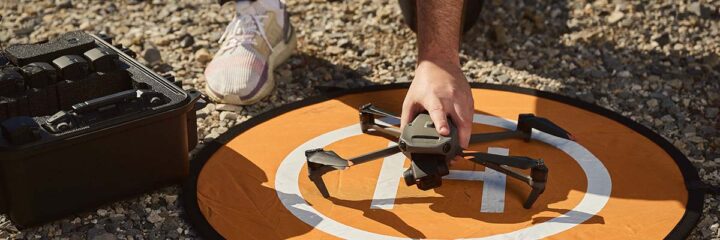
Drone Thermal Roofing Analysis – FAQs
When it comes to protecting your property, your roof is one of your biggest investments. But many roofing problems—like water intrusion, hidden leaks, or poor insulation—aren’t visible during a basic inspection. That’s where drone thermal roofing analysis (also called an infrared roof scan) comes in. Using drone-mounted thermal cameras, FlyGuys helps property owners spot problems early, save money, and make smarter maintenance decisions.
Below are answers to the most common questions about thermal roofing analysis.

Thermal Roofing Analysis – Frequently Asked Questions
- What is thermal roofing analysis?
Thermal roofing analysis, also known as an infrared roof scan, or thermal inspection, uses drone technology to detect temperature differences on a roof. These temperature changes reveal hidden problems like leaks, wet insulation, and heat loss—issues that aren’t visible during a standard roof inspection. - How does it work with drones?
Our drone roof inspections use infrared cameras to capture high-resolution thermal images. These scans highlight hot and cold spots across your roof, giving you a clear picture of its condition without the need for someone to climb onto the roof. - What problems can thermal imaging find on my roof?
A thermal roof scan can identify:
-
- Water intrusion and roof leaks
- Trapped moisture in roofing materials
- Insulation gaps and heat loss
- Areas of potential structural weakness
- Water intrusion and roof leaks
- Can thermal scans show me if my roof is leaking?
Yes. Infrared roof inspections are one of the most effective ways to detect roof leaks and moisture damage early, often before they become visible indoors. - Will this work on both residential and commercial roofs?
Absolutely. Drone thermal inspections are used for residential homes, commercial buildings, and large industrial facilities with equal accuracy. - How accurate are thermal scans compared to a physical inspection?
Thermal roofing analysis provides a non-invasive, highly accurate assessment of hidden roof problems. While it complements a physical inspection, infrared scans can detect issues that traditional inspections often miss. - Do I need to be home or on-site during the scan?
No. Our licensed drone pilots can safely complete the infrared roof inspection without you being present, as long as we have safe access to the property. - How long does a roof scan take?
Most residential roof inspections take less than an hour. Larger commercial properties may require more time, but our drone-based process is faster and safer than manual inspections. - Is it safe for the roof and the drone?
Yes. Since the drone captures thermal data from above, there’s no risk of damage to your roof. Our pilots follow strict FAA safety guidelines during every mission. - Can you find insulation problems with this technology?
Yes. Thermal roofing analysis identifies where heat is escaping, making it easy to spot missing or failing insulation that affects your energy efficiency. - How often should I get my roof scanned?
We recommend scheduling a thermal roof inspection annually, or after major weather events like hurricanes, hailstorms, or heavy rain—especially for flat or aging roofs. - How much does thermal roofing analysis cost?
The cost depends on the size and complexity of your roof. FlyGuys provides upfront pricing so you’ll know exactly what to expect before scheduling. - Can this help me save money on energy bills?
Yes. By finding insulation problems and air leaks, infrared roof inspections can help you improve efficiency, reduce wasted energy, and save money long-term. - Does insurance accept thermal roofing reports?
Many insurance companies accept drone thermal inspection reports as supporting evidence for claims related to leaks, storm damage, or water intrusion.

Ready to See What’s Really Happening Above Your Head?
Don’t wait until small issues turn into costly repairs. With FlyGuys’ nationwide network of licensed drone pilots, we make thermal roofing scans fast, accurate, and accessible for homeowners, businesses, and property managers across the country.
Read more about roofing inspections here.